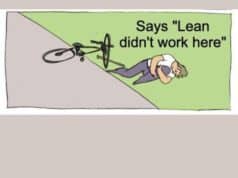Thanks, as always, to Ryan McCormack for this. He always shares so much good reading, listening, and viewing here! Subscribe to get these directly from Ryan via email.
News, articles, books, podcasts, and videos about how to make the workplace better.
Operational Excellence, Improvement, and Innovation
Global State of Operational Excellence
It's that time of year again. PEX has released its 24/25 survey of the global state of OpEx and Transformation. See how industries around the world are applying operational excellence principles, what stage of transformation they are at, and what capabilities they are investing in.
Operational Excellence vs. Continuous Improvement
What's the difference between operational excellence and continuous improvement? In short, continuous improvement focuses on, well, continuously improving, while operational excellence focuses on optimizing an organization's operations to achieve outstanding performance and sustainable competitive advantage.
Workplace Safety and Operational Excellence Are Inseparable
Safety shouldn't be optional. It's a non-negotiable ethic and mindset of organizations seeking operational excellence. The link between safety and operational performance is clear – employers who fully embrace worker safety experience better quality and lower costs. Regardless of ROI, there is also a moral imperative to keep people safe and do no harm. David Michaels, Ph.D., former U.S. assistant secretary of labor for the Occupational Safety and Health Administration shares six steps that leaders need to take to implement effective safety management systems.
What I've Been Reading
On a recent Trans-Atlantic flight I read Oops! Why Things Go Wrong by Niall Downey, a challenge to healthcare professionals to improve reliability and how errors are handled by borrowing wisdom from other disciplines and industries which have much higher rates of safety and reliability. Downey is a thoracic surgeon turned pilot, giving him a unique perspective and experience. I highly recommend it to anyone interested in patient safety, just culture, and high-reliability organizations. I provide a very high-level summary here.
I've always worked in the field of organizational transformation, so understanding change and improvement is always of interest. I dug into the philosophical side of change and self-improvement with a pair of accessible books from Adam Phillips, Wanting to Change and Getting Better. Both have given me pause for thought and questions on the potential effectiveness of common change management approaches.
Creating a Culture of Improvement
Organizations May Be better Off Randomly Selecting Managers
What makes a good manager? Everyone has an opinion, but a study from the National Bureau of Economic Research shows that good managers matter, and that self-promoted managers outperform randomly selected managers. Organizations have a bias towards overconfidence and extraversion that may result in selecting ineffective managers. The study suggests that skills are much better predictors of performance than personality traits.
When a Team Member Speaks Up and it Doesn't Go Well
I've been “Elena,” the new team member who doesn't know any better and challenges the manager openly at a meeting. I've also been “Raya,” the oblivious manager who doesn't notice the impact of their prickly response in such scenarios. There are critical moments when a team member speaks up that have enduring cultural impacts. Here are four habits to practice to keep learning from conversation failures.
Coaching – Developing Self & Others
It still happens to me often. A leader I respect assigns me a task and a deadline – normal enough. I want to please them. I start diligently on the work, but then I start second-guessing myself. What if this isn't what they expect? What if I fail to deliver? They will be so disappointed in me. They must be thinking about me and that I'm a total failure. And the spiral continues.
The good news for people pleasers? The people you're trying to please are probably not thinking about you at all. They have their own problems. Oliver Burkeman shares some valuable reassurances on how to stop people pleasing.
This article made me think of this scene in Mad Men:
And similarly this iconic scene from The Bear where the understudy chef, after spending years wracked by anxiety, confronts what he feels is the source of his demons, his former demanding mentor, only to discover the mentor doesn't think about him at all.
Remember, they're probably not thinking about you – and that can be liberating.
What Got You Here Won't Get You There
Everyone always complains about a lack of senior leadership buy-in as a reason why transformational efforts fail. One of the main reasons for this is simple: many senior leaders have been successful (as evidenced by their roles) by using a reliable set of playbooks and behaviours. Asking leaders to shift their behaviours would appear irrational to them.
How can successful leaders then shift their behaviours, despite what's worked for them in the past? Superstar coach Marshall Goldsmith joined Dave Stachowiak on Coaching for Leaders episode 696: The Habits that Hold Leaders Back sharing a densely packed conversation of sage advice for senior leaders.
Follow Ryan & Subscribe:
LinkedIn: https://www.linkedin.com/in/rjmccormack/
Subscribe to receive these via email
What do you think? Please scroll down (or click) to post a comment. Or please share the post with your thoughts on LinkedIn – and follow me or connect with me there.
Did you like this post? Make sure you don't miss a post or podcast — Subscribe to get notified about posts via email daily or weekly.
Check out my latest book, The Mistakes That Make Us: Cultivating a Culture of Learning and Innovation:









